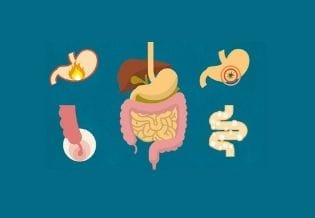About the Journal of Digestive Disorders and Diagnosis
A peer-reviewed, open-access journal dedicated to advancing diagnosis, treatment, and research in gastrointestinal and hepatobiliary diseases through rapid dissemination of high-quality clinical and translational science.
JDDD's mission is to serve as a trusted, comprehensive, and freely accessible resource for the latest findings and advancements in digestive health. We publish multidisciplinary content that informs evidence-based practice, drives mechanistic discovery, and shapes patient-centered care strategies. Our commitment extends beyond publication-we actively support authors through transparent editorial workflows, ethical stewardship, and global visibility initiatives.
We champion research excellence by:
- Ensuring scientific integrity: Rigorous peer review by subject matter experts in gastroenterology, hepatology, pancreatic diseases, inflammatory bowel disease, gastrointestinal oncology, and advanced endoscopy.
- Accelerating knowledge dissemination: Rapid editorial decisions (average 36 days to first decision) and immediate online publication upon acceptance.
- Maximizing research impact: Open access licensing (Creative Commons CC BY 4.0) enables unrestricted sharing, citation, and reuse by clinicians, educators, and guideline developers worldwide.
- Supporting diverse methodologies: Original research, systematic reviews, meta-analyses, case series, technical innovations, editorials, and hypothesis-generating reports.
- Promoting ethical transparency: Mandatory conflict of interest disclosure, institutional review board approval documentation, and adherence to COPE guidelines for publication ethics.
JDDD publishes research across the entire spectrum of digestive disorders, reflecting the anatomical and functional complexity of the gastrointestinal system. Our scope encompasses clinical investigations, translational research, diagnostic innovations, therapeutic trials, and epidemiological studies addressing diseases of the digestive tract and accessory organs.
Gastroesophageal reflux disease, Barrett's esophagus, eosinophilic esophagitis, motility disorders, esophageal cancer, and dysphagia management.
Peptic ulcer disease, Helicobacter pylori infection, gastritis, gastroparesis, gastric cancer, and bariatric surgery outcomes.
Crohn's disease, ulcerative colitis, biologics therapy, microbiome research, surgical management, and quality of life studies.
Colorectal cancer screening, polyp surveillance, diverticular disease, irritable bowel syndrome, constipation, and fecal microbiota transplantation.
Chronic viral hepatitis, non-alcoholic fatty liver disease, cirrhosis, hepatocellular carcinoma, transplant outcomes, and portal hypertension.
Acute and chronic pancreatitis, pancreatic cancer, cholangiocarcinoma, biliary strictures, gallstone disease, and endoscopic retrograde cholangiopancreatography (ERCP) innovations.
Irritable bowel syndrome, functional dyspepsia, chronic abdominal pain, visceral hypersensitivity, and brain-gut axis research.
Colonoscopy quality metrics, therapeutic endoscopy, endoscopic ultrasound, capsule endoscopy, ablation techniques, and device innovations.
Early detection strategies, molecular biomarkers, chemoradiotherapy protocols, immunotherapy, and survivorship care.
All published articles are immediately and permanently available online without subscription fees or paywalls. This unrestricted access maximizes your research's visibility, citation potential, and real-world impact-enabling clinicians in resource-limited settings, medical students, policymakers, and patient advocacy groups to benefit from your findings.
JDDD recognizes that timely dissemination is critical in rapidly evolving fields like inflammatory bowel disease biologics, endoscopic innovation, and hepatocellular carcinoma management. Our streamlined editorial workflow delivers first decisions within approximately 36 days and publishes accepted manuscripts online within 4 days of final acceptance. Authors receive regular status updates and can track their submissions through our manuscript management system.
Every submission undergoes evaluation by independent experts with specialized knowledge in the relevant subdiscipline. Reviewers assess study design, statistical methodology, clinical relevance, reproducibility, ethical compliance, and contribution to existing literature. Constructive feedback strengthens manuscripts regardless of final decision, and authors are given fair opportunity to address reviewer concerns through revision.
JDDD maintains reasonable Article Processing Charges (APCs) designed to reflect global economic diversity. Fees can be covered by authors, funding agencies, or institutional memberships. We offer APC waivers or discounts for corresponding authors from low- and middle-income countries, early-career researchers, and unfunded studies demonstrating significant clinical or scientific merit. Contact our editorial office to discuss eligibility.
JDDD values the scholarly contributions of peer reviewers and editorial board members. Reviewers and editors who provide thorough, timely reports receive recognition through certificates of service and APC discounts on future submissions. This acknowledgment supports professional development, tenure portfolios, and continuing medical education requirements.
JDDD provides multiple submission pathways to accommodate diverse author preferences and institutional workflows. Before submission, authors should carefully review our Instructions for Authors, which detail formatting requirements, ethical guidelines, authorship criteria, conflict of interest policies, and required documentation.
Pre-Submission Preparation
Review journal scope and author guidelines. Ensure ethical approvals, informed consent, and clinical trial registration (if applicable) are documented. Prepare structured abstract, keywords, conflict of interest statement, funding acknowledgments, and author contribution statements using CRediT taxonomy.
Manuscript Submission
Submit via email ([email protected]), online submission form, or Manuscript Zone portal. Include cover letter summarizing novelty, clinical significance, and compliance with ethical standards. Upload manuscript files, figures, tables, and supplementary materials.
Editorial Screening and Peer Review
Managing editors conduct initial scope and quality screening within 72 hours. Suitable manuscripts are assigned to associate editors who coordinate peer review by 2-3 independent experts. Authors receive reviewer feedback with editorial decision (accept, revise, or reject) and revision guidance.
Revision and Final Decision
Authors submit revised manuscripts with point-by-point responses to reviewer comments. Revised submissions are re-evaluated by original reviewers or editorial team. Final decisions are communicated promptly, typically within 36 days of revision receipt.
Production and Publication
Accepted manuscripts undergo copyediting, formatting, and DOI assignment. Authors review proofs (usually within 4 days) before final publication online in HTML, XML, and PDF formats. Articles are immediately indexed and discoverable through library databases, Google Scholar, and academic search engines.
Upon acceptance and peer review completion, articles are published under a Creative Commons Attribution 4.0 International (CC BY 4.0) license. This license grants readers worldwide the right to access, download, share, adapt, and build upon published work for any purpose, provided appropriate credit is given to the original authors. Authors retain copyright ownership while enabling maximum dissemination and reuse.
For detailed information about copyright policies, author rights, and reuse permissions, please consult our Copyright and Licensing page.
Distinguished Leaders in Digestive Health
JDDD's editorial board comprises internationally recognized gastroenterologists, hepatologists, pancreatic specialists, colorectal surgeons, endoscopists, and translational researchers from leading academic medical centers worldwide. Board members provide scientific oversight, ensure peer review quality, shape journal policies, and champion ethical publishing standards. Their diverse expertise ensures balanced evaluation across all digestive system subspecialties.
Editorial board members receive certificates of recognition and APC waivers in acknowledgment of their service. Qualified researchers interested in joining our board can review eligibility criteria and apply through our Editorial Board page.
JDDD publishes a broad range of scholarly content to accommodate different research methodologies, findings, and communication needs:
- Original Research Articles: Full-length reports of clinical trials, cohort studies, case-control studies, diagnostic accuracy studies, and laboratory investigations.
- Systematic Reviews & Meta-Analyses: Comprehensive, evidence-based syntheses of current knowledge on specific topics using systematic methodology and statistical pooling where appropriate.
- Narrative Review Articles: Expert summaries and critical evaluations of current literature on focused topics, providing context and insight for clinical practice or research directions.
- Short Communications & Rapid Communications: Concise reports of preliminary findings, pilot studies, or time-sensitive observations with high clinical or scientific relevance.
- Clinical Case Reports & Case Series: Documentation of rare presentations, unusual complications, novel diagnostic approaches, or unexpected treatment responses in individual patients or small cohorts.
- Methods & Validation Studies: Descriptions of new methodologies, assays, or tools with validation data demonstrating reliability, reproducibility, and clinical utility.
- Diagnostic Innovations & Technical Notes: Practical descriptions of new endoscopic techniques, imaging protocols, surgical innovations, or diagnostic devices with immediate applicability.
- Data Notes & Negative Results: Publication of well-documented datasets, null findings, or replication studies to enhance transparency and reduce publication bias.
- Clinical Practice Guidelines & Consensus Statements: Evidence-based recommendations developed by expert panels using formal consensus methods to guide clinical decision-making.
- Perspectives & Commentaries: Expert opinions on emerging trends, controversies, policy issues, or future research directions in digestive health.
- Editorials & Opinion Pieces: Invited or submitted articles offering personal viewpoints on recent publications, societal impacts, or ethical considerations in gastroenterology.
- Letters to the Editor: Brief communications responding to previously published articles, reporting preliminary data, or raising questions of clinical interest.
- Conference Proceedings & Meeting Reports: Summaries of key presentations, debates, and consensus points from major scientific meetings in gastroenterology and hepatology.
- Book Reviews: Critical evaluations of recently published books relevant to digestive disorders, clinical practice, or medical education.
Join the Global Community of Digestive Health Researchers
Whether your work focuses on mechanistic discovery, diagnostic innovation, therapeutic trials, or health services research, JDDD provides a trusted platform for sharing your findings with clinicians and scientists worldwide. Benefit from rapid publication, rigorous peer review, global visibility, and open access impact.
Questions or Support Needed? Contact the JDDD editorial office at [email protected] for assistance with submissions, peer review inquiries, APC waivers, or technical support. Our team is available 24/7 to support your publishing journey.


